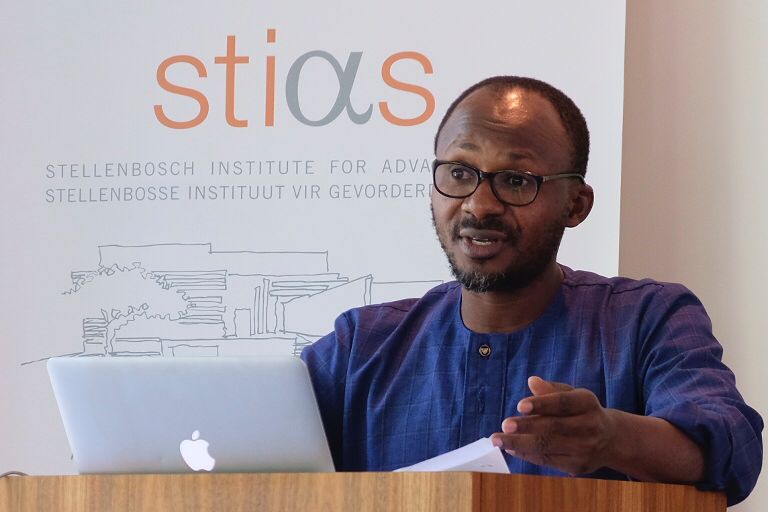“Epistemic decolonisation is currently a central theme in most scholarly discourses, but it has become fashionable among African scholars to engage this crucial topic without recourse to its underlying causes,” said STIAS Iso Lomso fellow Husein Inusah of the Department of Classics and Philosophy, University of Cape Coast, Ghana. “Using the root-cause analysis process, this study holds that epistemic decolonisation agitations should be discussed within the purview of what gave rise to them because problem-solving requires unearthing the underlying causes so that effective solutions can be proffered. To diagnose the inherent dynamics of epistemic decolonisation this study takes, as the starting point, the notion that epistemic colonisation is a moral problem, requiring moral restitution.”

“The field of epistemiological decolonisation received attention only after #RhodesMustFall in 2015. There was an explosion of literature but none of it tackled the underlying causes,” he added. “We argue past each other and don’t touch the fundamental causes. I’m taking on that task – looking at the moral dimensions of epistemiological decolonisation.”
“I believe earlier attempts to epistemically decolonise knowledge in Africa have often failed to set the trajectory towards successful moral restitution of epistemic decolonisation in Africa.”
Still in the early stages of his project, Inusah will approach the topic from various angles. He will start by examining a range of ethical theories dubbed moral transcendentalism. He explained that there are two popular theoretical views – Divine Command Theory and Natural Law Theory.
“Divine Command Theory states that morality is dependent on a divine entity. It’s very popular in monotheistic religions. The problem is that it relies on the view that the moral self relies on divine authority which robs the individual of rational will.”
“Natural Law Theory says that morality originates from a human as a natural being not dependent on a supernatural being. It derives from German Philosopher Immanuel Kant who called it a categorical imperative. We are endowed as rational beings to take moral decisions. But it also establishes objective and universal moral laws beyond the individual human.”
Inusah intends to juxtapose these theories against a biological evolutionary account of morality.
“In a biological account of morality organisms transmit ethical and moral codes to their offspring and moral codes become part of cultural evolution,” he explained.
“We know from examples and experimentation that animals exhibit moral sentiments. There are indications that moral sentiments are rooted in human ancestry and can be studied via evolutionary biology.” He pointed out that mapping neuronal functions during moral thinking has shown where this lies in the brain – the ventromedial prefrontal cortex.
He also pointed to examples from the animal world where animals work together for the group instead of individual good – “this includes predators enhancing their chances of capturing prey by acting together but, equally, the prey enhance their chances of survival by banding together”.
He traced a framework from moral aptitude which leads to moral sentiments which, in turn, lead to moral norms which lead to institutional norms.
“Moral sentiment shaped by cultural evolution gives rise to moral conventions,” he explained. “When moral conventions violate moral sentiments this gives rise to things like racism, xenophobia, etc.”
“I believe epistemic transcendentalism violates human moral sentiments founded upon heredity. The framework supplied by a biological evolutionary account aligns with certain major epistemic virtues, the lack of which give rise to things like epistemic colonisation.”
Multiple ontologies
Inusah will also unpack ideas from African and Western metaphysics and ontology to see if they are useful in explaining epistemiological colonisation.
“In African ontology the vital force is holistic and inclusive. Entities are interconnected and complementary, rooted in communitarianism. This is seen, for example, in Ubuntu and Ibuanyidanda ontologies. Human identities are shaped by social, spiritual and ecological relations with an emphasis on empathy.”
“Western metaphysics relies more on exclusivity, independence and autonomy, as well as the existence of binary relationships between entities like good and evil, heaven and hell, mind and matter.”
Inusah believes we need a balance between the moral sentiment of empathy and the regulation offered by autonomy.
The challenge is in achieving the balance. “How do we get a balance? One possibility is virtue studies in which persistent performance of character traits produce certain habits. We need to repeat good moral sentiments until they become a habit. The hurdle is that virtue studies focus on moral and civic virtues and intellectual and epistemiological virtues are not given enough attention. I would like to model a system of epistemiological and intellectual values to address epistemiological colonisation.”
“To be human you have to balance empathy and autonomy – to realise both yourself and other people – and to share good evenly,” he said. “I’m trying to see if this view fits with other views of decolonisation. If we could regulate moral aptitude we could solve many world problems.”
And Inusah plans to do this in an interdisciplinary way. As part of the project, he will examine Akan and Yoruba epistemic virtue proverbs and theorise how they can be harnessed to transform knowledge. “The agenda of decolonising knowledge has focused principally on curricular and pedagogical theories. This project deploys an interdisciplinary approach that also focuses on non-cognitive factors. I’m hoping to conceptualise a comprehensive African-led, all-embracing perspective to foster the right endogenous African mindset and character traits required for reforming the curricula and decolonising knowledge in Africa.”
Michelle Galloway: Part-time media officer at STIAS
Photograph: Noloyiso Mtembu
